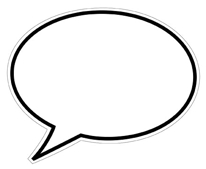A couple of days ago I wondered if it’s OK for freelance writing bloggers to talk like they speak. After all, blogging is a much more casual form of writing than what most of us are used to. While some purists don’t always appreciate a conversational tone when reading the news or learning about vitamin supplements, the truth is, that’s where we’re headed. The Internet has turned writers into bloggers and everything is all so ultra-cas now.
Writing for Short Attention Spans
Look around at your favorite news, medical and even government sites and what do you see? News sites feature more bloggers than journalists. News is no longer a one way show. We can digest and then discuss. We can even counterpoint if we want to – and receive more traffic with our rebuttal than the original post.
We’re told Internet readers have short attention spans and would much rather scan headlines and look for juicy bits than commit to an entire article.
Everyone giving a web writing lesson encourages us to:
- Write short sentences
- Use a conversational tone
- Break up text with sub heads, lists. and bullet points
- Keep it to 500 to 1,000 words
Twenty years ago it wasn’t so easy being a freelance writer. Now? Not so much. Anyone can become published on the web and many of us are even paid for it. The new breed of writers don’t have to have a degree in journalism or mass communications, heck, they don’t have to finish school at all if that’s not how they roll.
I’m not saying all this is a bad thing, but I often pause to consider where we’re headed.
Are we still interested in a formal tone?
I wonder what all this means for writing and writers now and in the future. Is America getting used to casual, short attention span reading? Are we doing the bulk of our reading via smartphone on the morning commute?
Do we trust a conversational tone over a formal tone?
It was announced yesterday that Newsweek is up for sale as newsweeklies lose their influence. We’re now learning what we need to know in 140 characters or less, so who has time for an entire magazine? If our trusted sources can’t be considered influential anymore, what can?
Where are we headed ?
I know there are many of us who still enjoy holding books or newspapers. As loyalists get older and the younger generation finds new methods of reading, paper copies are going to be a thing of the past. Why buy books and magazines when we can listen to them or download them onto electronic readers? Why recycle or dust worn volumes when there’s no need? Even I, the daughter of a librarian, am moving towards more electronic reading and fewer physical copies.
It’s no secret that it’s more difficult to read on a screen, which is why we teach short and sweet web writing now. Does that mean we’re going to be writing more to accommodate laptops, electronic readers and short attention spans? As more “citizen journalists” try their hand at this blogging thing, what will happen to the old school way of writing?
I recently wondered about the future of reading. To be honest, I’m more interested in the future of writing.
What are your thoughts on this? Does our future show a more casual way of reading and writing?


Leave a Reply